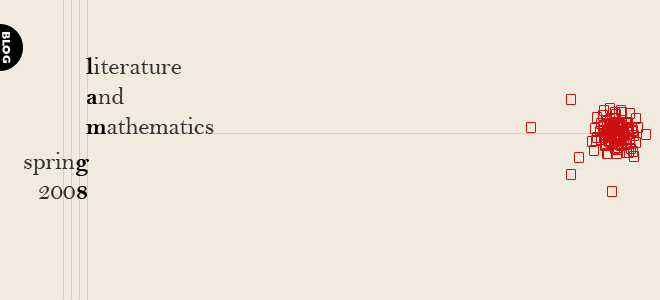After hours of gusting away a tower of gray insulation-grade dust hiding the interior organs of my P.C., it seems this was just the treatment my dear SHLOBOO required. She returned to good health despite the onset of a new strained wheezing, necessitating the contact of a moderately aggressive technical tap to set her right. Once again she gave me quite the scare. I am glad once more to be able to record my thoughts.
The reflective blogs posted before my own have put me too into a reflective mood. And I suppose this has its value in light of the impending Learning Record. I came into this class with a taste for science-fiction, dystopian novels, and an aesthetic appreciation for math. I must confess I had never really taken note of the importance of math in We. I had not anticipated the focus on mental instability and delusion, but greatly appreciate its fascinating incorporation with the consideration of math. If you enjoy the delusional passion of one who is consumed in the knowledge that they are on the edge of fantastical discovery I highly suggest Robert Charles Wilson. Every story in The Perseids and Other Stories has that same wonder of possibility shown in Pi, VAS, sort of A Beautiful Mind, and maybe We. Insanity is the strand that connects the stories.
The first story has a young, very poor boy as the soul caretaker for his schizophrenic sister. His mentor is the owner of a bookstore who exchanges chess games with the very strategically gifted boy for books. Eventually secrets of the universe and the patron are revealed that considerably change the context by which he defines his sister’s insanity. All the stories are like this, sane protagonists are shown increasingly insane with such subtly as to surprise both the reader and the protagonist himself that he has been so led on. There is also a strong theme of a love for the strange.
Perhaps a few excerpts will whet your interest: from the title story, The Perseids,
“What made Roger’s notion original was that he believed human beings had—for the first time in millennia—begun to colonize a wholly new domain, which he called the gnosophere: the first abroad, the ghosophere felt more like geology than ecology: a body of artifacts, lifeless as bricks. [….] “But the gnosophere at the end of the twentieth century had grown vast and intricate, a landscape both cerebral and electronic, born at the juncture of technology and human population, in which crude self-replicating structure (Nazism, say; Communism) had already proven their ability to grow, feed, reproduce, and die. Ideologies were like primitive DNA floating in a nutrient soup of radio waves, television images, words.”
Sound a little like VAS?
In the Afterward, Wilson reflects on each of the stories where another excerpt echoes VAS:
“People love cats. Because we love them, we surgically alter their genitalia, keep them confined in our homes, and subject them to lethal injection when they become ill or inconvenient. At work in this story is the awful suspicion that something out there loves people.” (This refers to a story titled Ulysses Sees the Moon in the Bedroom Window about aliens)
I’m done blabbing about some of my favorite books, but I hope you enjoyed the excerpts. Cheers, here's to a productive weekend.
Saturday, April 19, 2008
What They Said
Subscribe to:
Post Comments (Atom)

1 comment:
Wild. I have actually been talking and debating things like this "gnosophere" you talk about all freakin' weekend. I think it is crazy how all things seem to be connected. i think i am going to have to try and find that book so that i can continue through some it, since my interest has indeed been whetted.
Post a Comment